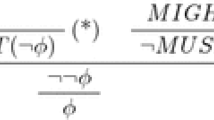Abstract
The response to Kripke’s modal argument I wish to propose appeals to the distinction between indicative descriptions, i.e., descriptions formed using indicative verb forms, and what I shall call subjunctive descriptions, descriptions formed using non-indicative verb forms used in subjunctive conditionals. The contrast is between ‘the person who is richer than anyone else in the world’ and ‘the person who would have been richer than anyone else in the world’. The response to Kripke’s modal argument is that indicative descriptions are always rigid designators and so do not contrast with proper names.
Similar content being viewed by others
Notes
To insist on the significance of the distinction between subjunctive and indicative verb forms is, of course, not to deny entailments between subjunctive and indicative conditionals. ‘If Mary came to the party she would have taken the car. Mary didn’t take the car. So Mary didn’t come to the party’ is valid since the first premiss entails ‘if Mary came to the party she took the car’. But it is not an instance of modus tollens.
To infer anything stronger would be like inferring an ambiguity in ‘some man’ from the ambiguity of ‘some man might have been immortal’. Note that the ambiguities discussed in the text are present here also. ‘If the Gods had so decreed, some man would have been immortal’ is ambiguous between ‘If the Gods had so decreed, something that would have been a man would have been immortal’ and ‘If the Gods had so decreed, something that is a man would have been immortal’ which differ in the powers they ascribe to the Gods. The same ambiguity affects ‘If the Gods had so decreed, every man would have been immortal’.
References
Burgess, J. (2006). Saul Kripke naming and necessity. In J. Shand (Ed.), Central works of philosophy (Vol. 5, pp. 166–186). Chesham: Acumen.
Kripke, S. (1973). Naming and necessity. In D. Davidson & G. Harman (Eds.), Semantics of natural language (pp. 252–355). Dordrecht: Reidel. Reprinted in revised form as a monograph by Basil Blackwell, Oxford, 1980.
Kripke, S. (1977). Speaker’s reference and semantic reference. Midwest Studies in Philosophy, II, 255–276.
Author information
Authors and Affiliations
Corresponding author
Rights and permissions
About this article
Cite this article
Noonan, H. A Flaw in Kripke’s Modal Argument?. Philosophia 41, 841–846 (2013). https://doi.org/10.1007/s11406-012-9388-z
Received:
Revised:
Accepted:
Published:
Issue Date:
DOI: https://doi.org/10.1007/s11406-012-9388-z




